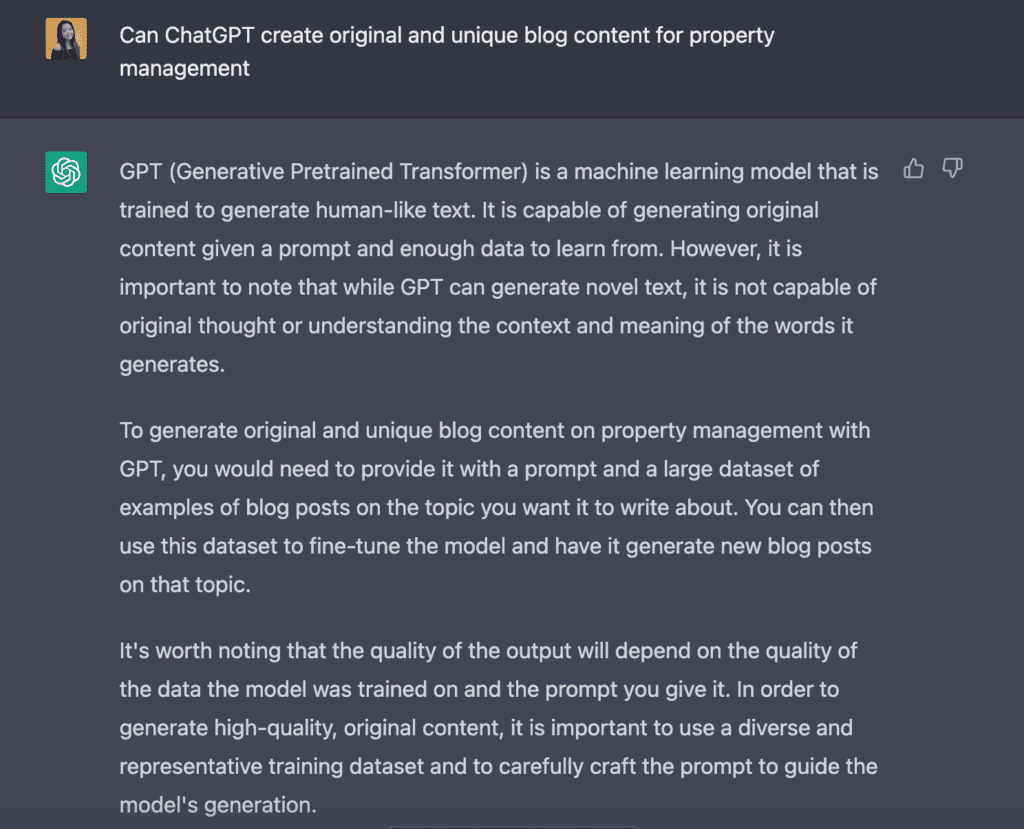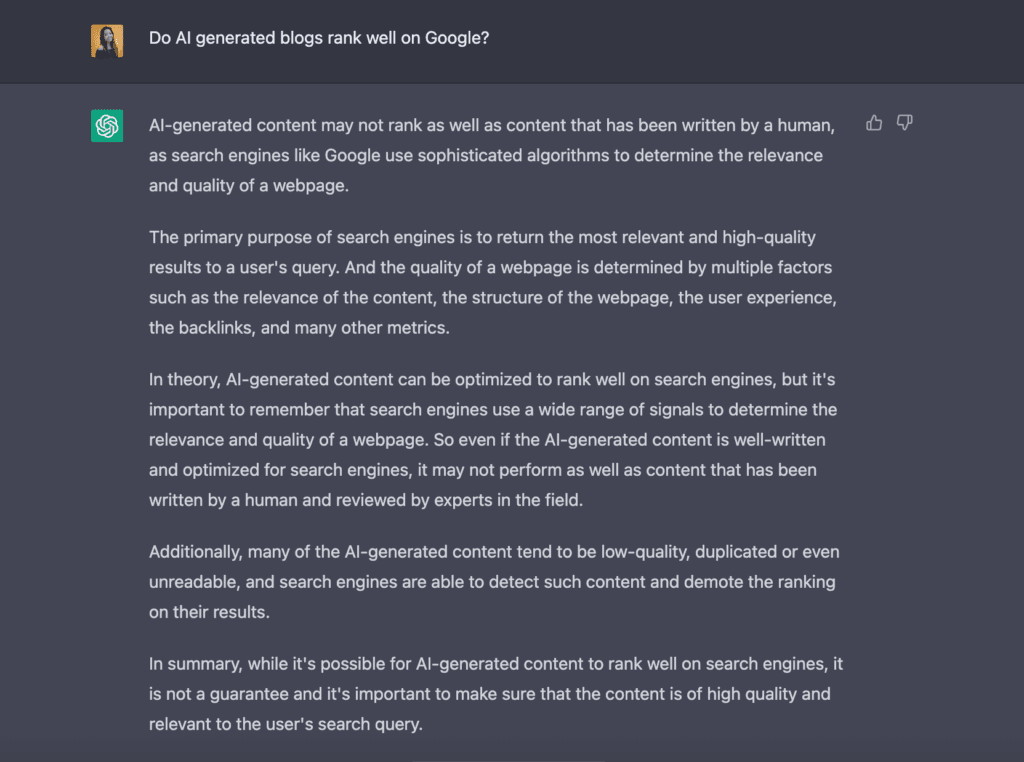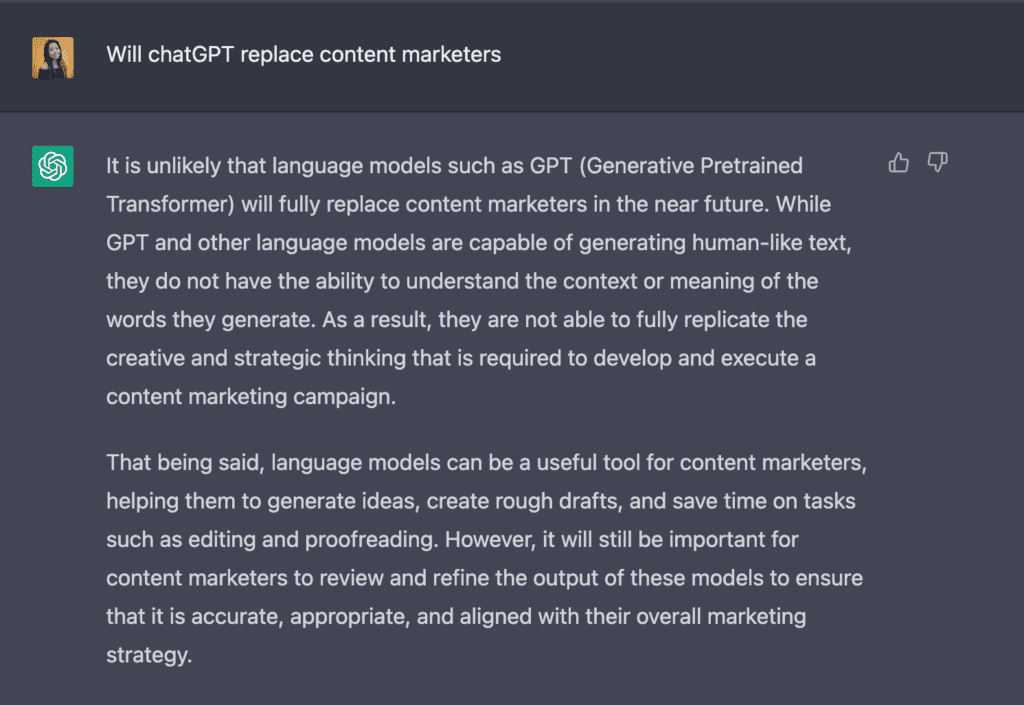Have you heard about the new shiny piece of technology taking the world by storm?
It’s called ChatGPT.
In case you haven’t heard the buzz yet, here’s a quick overview:
What is ChatGPT?
 ChatGPT is Artificial Intelligence (AI)-powered chatbot that’s been trained to respond like a human would. It can take a few words or sentences that you type in and use them to write a whole paragraph or even a whole story.
ChatGPT is Artificial Intelligence (AI)-powered chatbot that’s been trained to respond like a human would. It can take a few words or sentences that you type in and use them to write a whole paragraph or even a whole story.
But that’s just scratching the surface.
You can “talk” to it as if you were talking to a person via chat, and the possibilities are endless.
AND it’s free – at least for now.
Since its launch on November 30, 2022, it has been used by over a million people to search for information and write anything from computer code to poetry or music. While it’s controversial, students have been using it to write essays and papers for school.
You might be thinking the same thing we are: can this AI write property management content?
How Does ChatGPT Work?
If you’re asking whether it can WRITE a property management blog, the answer is YES.
ChatGPT can write on almost any topic.
How?
Using a technology called Natural Language Processing (NLP) and machine learning, ChatGPT can generate blog text pretty easily. It has read much of the internet up until 2021 as part of its training dataset, so it uses all that information to scrape together something that satisfies whatever prompt you give it.
Keep in mind that this tool has its limitations.
OpenAI, the developer of this tool, is upfront about what doesn’t work:
- Sometimes, the chatbot can provide information that might sound plausible but is simply inaccurate.
- It also sometimes spews out information that is biased or nonsensical.
Think of it this way – when you search for the term “property management” on Google, it generates about 2.1 billion results in half a second (2,130,000,000 results within 0.60 seconds as of Jan. 9). That’s over 2.1 billion pieces of content related to the term “property management.” Of the 2.1 billion pieces of content, would all of those contain 100% accurate and unbiased information?
Probably not.
So, if ChatGPT is referencing an imperfect dataset, it comes as no surprise that it could sometimes come up with information that is inaccurate or biased.
Here’s another thing to consider: If it can write blogs, will the blogs be unique or is there a possibility of content duplication?
To answer that question, I decided to ask the chatbot itself:

Will AI-Generated Content Help You Rank Higher on Google?
Now you might be thinking, what about using ChatGPT to write content not for humans but plainly for SEO? Isn’t ranking all about the keywords anyway?
That’s a really good question.

Two factors affect output:
- The prompt or the input text that you provide is fully in your control.
- The dataset this technology was trained on is not in your control. We have no visibility on where the data is coming from or how the AI is trained.
There is no capability for original thought, and it’s possible to end up with duplicate content when using it to write blogs.
And as Google has said in the past, duplicate content is a no-no.
The text generated by ChatGPT could pass off as human, but it doesn’t necessarily write copy that leaps off the page or stands out. It will never be personalized to your specific property management company and its strengths and services.
There is more to SEO than the actual blog content you post online or the keywords you put in those blogs. In fact, Fourandhalf has covered this topic in our past blog posts. Feel free to check them out.
AI-generated content can HELP you?
Yes.
But, can you simply rely on tools like this to succeed?
No.
In fact, Google’s recent algorithm updates address the topic of AI-generated content in relation to search rankings. We’ll be releasing more on this subject soon, so stay tuned for that.
Will ChatGPT Replace Content Marketers?
It’s important to mention that as good as the responses sound, it is still a chatbot.
You still need to figure out the best prompts to give, you still need to spend time checking, rewriting, and then actually posting and sharing that piece of content online.
As a content marketer, I am not opposed to the development of AI technology such as ChatGPT. In fact, I used it to help me create this piece of content, as you can see.
I found though that although it’s a useful tool to help me with ideas, I couldn’t quite get the quality piece I wanted straight out of the chatbot. I still had to spend a lot of time rewriting, fact-checking, and adding to what it gave me.
At the end of the day, it’s not a magic bullet.
Just for fun, I wanted to see if ChatGPT thought it would replace marketers like our team here at Fourandhalf. Here’s what it said:

This response came from the chatbot itself.
And if you’re in need of the creative and strategic thinking from an experienced marketing team, look no further than Fourandhalf Marketing Agency.

